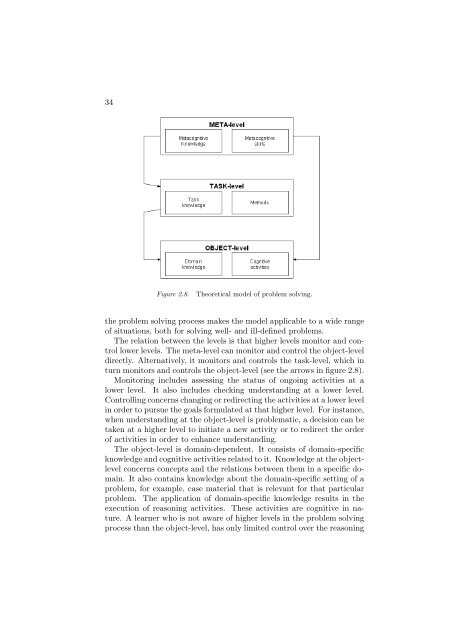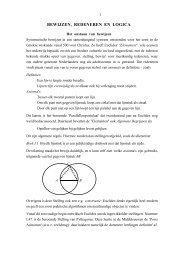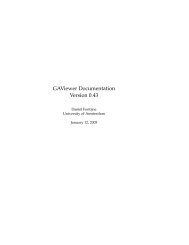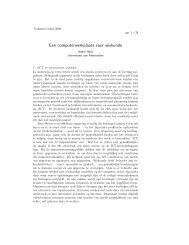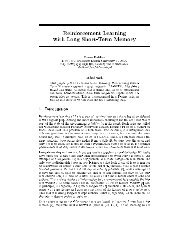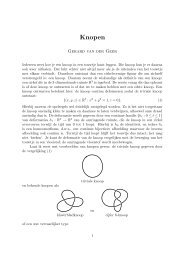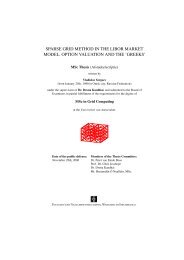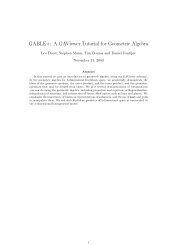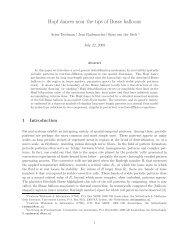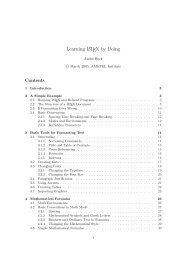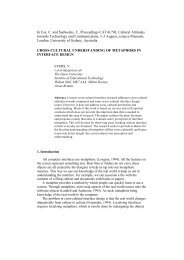The role of metacognitive skills in learning to solve problems
The role of metacognitive skills in learning to solve problems
The role of metacognitive skills in learning to solve problems
Create successful ePaper yourself
Turn your PDF publications into a flip-book with our unique Google optimized e-Paper software.
34<br />
Figure 2.8.<br />
<strong>The</strong>oretical model <strong>of</strong> problem solv<strong>in</strong>g.<br />
the problem solv<strong>in</strong>g process makes the model applicable <strong>to</strong> a wide range<br />
<strong>of</strong> situations, both for solv<strong>in</strong>g well- and ill-def<strong>in</strong>ed <strong>problems</strong>.<br />
<strong>The</strong> relation between the levels is that higher levels moni<strong>to</strong>r and control<br />
lower levels. <strong>The</strong> meta-level can moni<strong>to</strong>r and control the object-level<br />
directly. Alternatively, it moni<strong>to</strong>rs and controls the task-level, which <strong>in</strong><br />
turn moni<strong>to</strong>rs and controls the object-level (see the arrows <strong>in</strong> figure 2.8).<br />
Moni<strong>to</strong>r<strong>in</strong>g <strong>in</strong>cludes assess<strong>in</strong>g the status <strong>of</strong> ongo<strong>in</strong>g activities at a<br />
lower level. It also <strong>in</strong>cludes check<strong>in</strong>g understand<strong>in</strong>g at a lower level.<br />
Controll<strong>in</strong>g concerns chang<strong>in</strong>g or redirect<strong>in</strong>g the activities at a lower level<br />
<strong>in</strong> order <strong>to</strong> pursue the goals formulated at that higher level. For <strong>in</strong>stance,<br />
when understand<strong>in</strong>g at the object-level is problematic, a decision can be<br />
taken at a higher level <strong>to</strong> <strong>in</strong>itiate a new activity or <strong>to</strong> redirect the order<br />
<strong>of</strong> activities <strong>in</strong> order <strong>to</strong> enhance understand<strong>in</strong>g.<br />
<strong>The</strong> object-level is doma<strong>in</strong>-dependent. It consists <strong>of</strong> doma<strong>in</strong>-specific<br />
knowledge and cognitive activities related <strong>to</strong> it. Knowledge at the objectlevel<br />
concerns concepts and the relations between them <strong>in</strong> a specific doma<strong>in</strong>.<br />
It also conta<strong>in</strong>s knowledge about the doma<strong>in</strong>-specific sett<strong>in</strong>g <strong>of</strong> a<br />
problem, for example, case material that is relevant for that particular<br />
problem. <strong>The</strong> application <strong>of</strong> doma<strong>in</strong>-specific knowledge results <strong>in</strong> the<br />
execution <strong>of</strong> reason<strong>in</strong>g activities. <strong>The</strong>se activities are cognitive <strong>in</strong> nature.<br />
A learner who is not aware <strong>of</strong> higher levels <strong>in</strong> the problem solv<strong>in</strong>g<br />
process than the object-level, has only limited control over the reason<strong>in</strong>g


